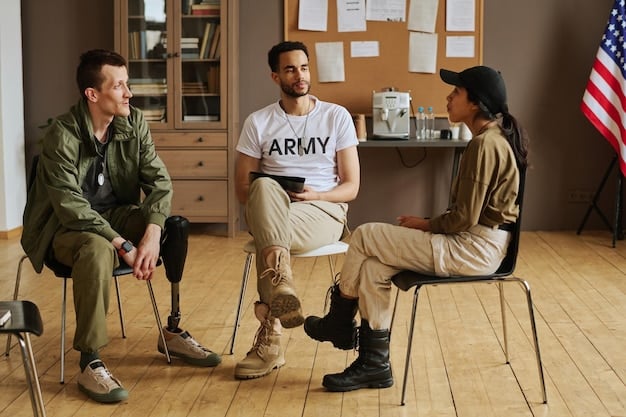Military Mental Health: How It’s Evolved in the Last 3 Years

In the last three years, the military’s approach to mental health has significantly evolved, showing increased awareness, reduced stigma, and enhanced access to care through innovative programs and policies.
The landscape of military mental health is constantly evolving, but how have things really changed on the ground? Let’s explore how the military’s approach to mental health has changed in the last three years.
Understanding the Starting Point: Mental Health in the Military Before
Before diving into the recent changes, it’s essential to understand what the military’s mental health approach looked like previously. Historically, there were significant challenges that impacted service members’ well-being.
Stigma and Underreporting
One of the major issues was the stigma surrounding mental health. Many service members feared that seeking help would negatively affect their careers.
Limited Resources and Access
Access to mental health resources was often limited, especially for those stationed in remote locations or deployed overseas. This posed a barrier to many seeking mental healthcare.
To summarize, the initial stages were marked by a culture where mental health issues were often sidelined due to prevailing stigmas and logistical challenges.
Increased Awareness and Reduced Stigma
One of the most significant shifts in the military’s approach to mental health has been the increased awareness and efforts to reduce stigma. This has paved the way for more service members to seek the help they need without fear of repercussions.
Education and Training Programs
The military has invested heavily in education and training programs aimed at raising awareness about mental health issues. These programs target both service members and leadership, aiming to foster a more empathetic and supportive environment.
These programs help to foster a more open and supportive environment within the military community.
- Peer Support Networks: Encouraging service members to support one another and share experiences.
- Leadership Training: Equipping leaders with the skills to recognize and address mental health issues in their teams.
- Anti-Stigma Campaigns: Publicly addressing common misconceptions and encouraging help-seeking behavior.

The focus on education and training has fostered a culture where mental health is viewed as a critical component of overall well-being, rather than a sign of weakness.
Expanded Access to Mental Health Services
In addition to reducing stigma, the military has also made significant strides in expanding access to mental health services. This includes increasing the number of providers and implementing innovative telehealth solutions.
Telehealth and Virtual Care
Telehealth has become an increasingly important tool for delivering mental health services, particularly for those in remote locations or with limited access to traditional care.
Integration with Primary Care
Integrating mental health services into primary care settings has also made it easier for service members to receive timely and coordinated care.
- Increased Number of Providers: Efforts to recruit and retain mental health professionals across all branches.
- Mobile Health Units: Deployable teams that can provide mental health support in the field.
- Confidential Counseling Services: Ensuring service members have access to confidential counseling without fear of career implications.
These efforts to make mental health services more accessible are helping to ensure that service members receive the care they need, when they need it.
Innovative Mental Health Programs
The military has launched several innovative programs aimed at addressing specific mental health needs within its population. These programs often take a holistic approach, integrating various therapeutic modalities.
Mindfulness and Resilience Training
Mindfulness and resilience training programs are designed to help service members develop coping skills and reduce stress. These programs often incorporate meditation.
Trauma-Informed Care
Trauma-informed care approaches recognize the prevalence of trauma among military personnel and tailor treatment accordingly.

By customizing mental health interventions to meet the unique needs of service members, the military is fostering a more supportive and effective environment for those seeking help.
Policy Changes and Their Impact
Policy changes have played a pivotal role in shaping the military’s approach to mental health. These changes often reflect a commitment to prioritizing the well-being of service members.
- Confidential Reporting Policies: Revised policies that protect the privacy of service members seeking mental health care.
- Mandatory Mental Health Screenings: Regular screenings to identify potential issues early on.
- Expanded Coverage Under TRICARE: Ensuring mental health services are covered comprehensively under the military’s healthcare system.
These policy changes are essential for creating a culture where mental health is not only valued but also actively supported through institutional frameworks.
Challenges and Future Directions
Despite the progress made, there are still several challenges that need to be addressed to further improve mental health support in the military. The future looks optimistic with ongoing advancements.
Addressing the Unique Needs of Veterans
Transitioning from military to civilian life can be challenging, and veterans often face unique mental health issues. Ensuring they receive the support they need is crucial.
As the military continues to evolve its approach to mental health, it is important to remain proactive and responsive to the changing needs of service members and veterans.
| Key Point | Brief Description |
|---|---|
| 💪 Reduced Stigma | Increased awareness campaigns encourage help-seeking behavior. |
| ⚕️ Expanded Access | Telehealth and integrated primary care options provide easier access. |
| 🧠 Innovative Programs | Mindfulness training and trauma-informed care are now implemented. |
| 📜 Policy Changes | Confidential reporting and mandatory screenings are now in place. |
Frequently Asked Questions
▼
The military has launched extensive education and awareness campaigns, promoting mental health as a critical aspect of overall well-being. These initiatives aim to reduce the stigma associated with seeking mental health support.
▼
Military members have access to virtual therapy sessions, online support groups, and mobile mental health apps. These telehealth options provide confidential and convenient access to mental healthcare, particularly for those in remote areas.
▼
Yes, the military offers specialized programs focusing on trauma-informed care. These programs employ treatments like cognitive processing therapy and eye movement desensitization and reprocessing (EMDR) to address PTSD symptoms.
▼
Military leaders can promote a supportive environment by encouraging open discussions about mental health, ensuring access to resources, and implementing policies that prioritize the well-being of their personnel.
▼
The military has implemented policies to protect the privacy of service members seeking mental health care. Confidential reporting policies and expanded coverage under TRICARE ensure that mental health services are accessed discreetly.
Conclusion
In conclusion, the past three years have witnessed significant strides in the military’s approach to mental health, driven by increased awareness, reduced stigma, expanded access to care, and innovative programs. While challenges remain, the ongoing commitment to prioritizing the mental well-being of service members and veterans signals a positive trajectory for future support.





